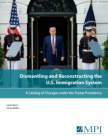Recent Activity

With the ten year anniversary of the September 11, 2001 attacks approaching, the Migration Policy Institute held a conference call to discuss the most significant changes that have occurred in the immigration arena in the decade since the attacks.
![EVENT%20PHOTO%202011.6.13%20Recession1web[1]](https://www.migrationpolicy.org/sites/default/files/styles/multimedia_slider_overlay_2/public/media_images/EVENT%2520PHOTO%25202011.6.13%2520Recession1web%5B1%5D.jpg?itok=7ZxGlEAN)
This Migration Policy Institute event was held to discuss the release of MPI's book, Migration and the Great Recession: The Transatlantic Experience, which reviews how the financial and economic crisis of the late 2000s marked a sudden and dramatic interruption in international migration trends.
Pages
Recent Activity
Los llamados de los activistas a "desbancar a la policía", a raíz de una serie de encuentros mortales para los miembros de la comunidad negra, hacen eco de las demandas anteriores de "abolir el ICE" y reflejar una crítica más amplia de los sistemas de aplicación percibidos como demasiado agresivo.























When Emergency Measures Become the Norm: Post-Coronavirus Prospects for the Schengen Zone